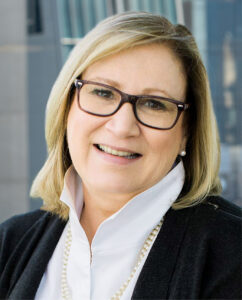Meet Our Team: Q&A with Managing Director for Data Analytics and Visualization, Kathy Rowell
 How did you become interested in working in healthcare and data analysis and visualization? Why did you choose this path?
How did you become interested in working in healthcare and data analysis and visualization? Why did you choose this path?
I had no plan for a career beyond knowing that I wanted one. My father was a publishing executive, and my mom was a teacher. When I was deciding on a college major and path forward, it came down to these two choices I knew. Spending my day like my mom, with first graders, or running a business, engaging with creatives, and flying around in jets. There was no competition – loved my mom – but dad, hand me my boarding pass.
So, with no real plan, I fell into working in healthcare when a college professor recommended me to an alum looking for a hospital finance manager. I stayed in the profession because it’s like a current event. There’s always something new and interesting to learn and do and that allows me to be innovative and work with smart people who are committed to delivering and improving care.
Mid-career, I attended a workshop delivered by the data viz guru Edward Tufte and fell in love with data visualization. I HAD to learn as much as I could; I HAD to be involved in data viz. Ask anyone on my team and I know they’ll agree – if you love it, you can’t imagine being on the outside looking in. You simply must be involved in the data viz community and the work.
As a final note, my actual career has in fact included teaching – at the undergraduate and graduate level, the professional level, and through our Kaleido platform. I married a teacher; my daughter is a teacher and is married to a teacher. It has all come full circle in a wonderful way.
What is your special area of expertise?
My expertise is my foundational and expert knowledge of healthcare systems, providers, payers, and financing, coupled with evidence-based medicine, research, and clinical quality and outcomes and my ability to quickly and accurately “connect the dots” between all of them.
What is your superpower and what is your kryptonite?
I hope that my superpower is identifying talented people and providing mentorship, support, and the space to learn and grow. Building great teams who create great work. Oh, and my insatiable curiosity.
My kryptonite – incurious people.
What types of clients do you typically serve?
The list of the types of clients we haven’t worked with is likely shorter than the ones we have! Providers, payers, researchers, med tech vendors, public health groups, specialty associations. Large and small, we work with them all. The industry is huge and part of what I have loved about our business is the opportunity to see and learn about so much of it that I never would have otherwise.
What is a project that you’ve worked on that you’re especially proud of?
This is like asking me to name my favorite child (well, not exactly given that I only have one)! But I’m going to duck this question because I’m immensely proud of our entire portfolio and I hope that folks will check out some of the projects on our website and in upcoming videos the team has created.
What have you enjoyed most about your role at Sellers Dorsey since its acquisition of HealthDataViz? What do you find most rewarding?
I’ve enjoyed learning about and becoming part of the Sellers Dorsey team. Everyone has been terrific – smart, welcoming, supportive. Building a business is hard and rewarding, and selling what you’ve built – your baby — is joyfully difficult. You want to make the best decision for your team, yourself and your family, your clients – and it’s rewarding when you feel as valued and welcomed as I have felt by the Sellers Dorsey team.
What are the biggest challenges you predict for clients in the next few years? What solutions do you hope will become more prevalent?
Data will continue to be a huge challenge. The myriads of sources, lack of interoperability and standardization, the list of challenges we face with health and healthcare data is literally endless. The technologies and innovations we can develop with better and higher quality data are immeasurable – here’s hoping we can be part of the solution of promoting better data to drive these opportunities.
What does impact mean to you?
I was fortunate to be taught by giants in the field of evidence-based medicine and outcomes – clinical, financial, operational – so to me, impact is just another word for outcomes. I might suggest however that we qualify and reframe what we hope is the result of our collective efforts to have – a positive impact.
What is one fun fact that people would be surprised to learn about you?
I can expertly parallel park any car.
What was your very first job?
In high school, I was a cashier at a grocery store. Mind you, this was in an age when only girls were hired as cashiers and only boys were hired to bag groceries. My inner feminist was secretly conflicted.
What is your favorite thing to do outside of work?
I love my garden, and I press flowers for artwork that I sometimes keep and often give as gifts. I’m an avid reader and Audible fan, and a podcast junkie from way back (Dan Benevento and I have been sharing podcasts we like for many years). My husband and I also travel a bit, hike, Kayak, walk the dog, and hang out with friends and family. We especially love time with our daughter Annie, best son-in-law ever Doug and 3-year-old wunderkind grand-babe Tess K. And I love to binge watch tv shows in the dead of winter and I’m not too proud to admit it.
Name your all-time favorite movie or book.
Favorite movies (can’t pick just one) – Super Bad, Erin Brockovich, The Graduate, It’s a Wonderful Life.
I love too many books to count, but every year without fail I read The Great Gatsby, and I’ve read everything by the brilliant David Sedaris.
Want to learn more about Kathy’s role at Sellers Dorsey?
Click here to explore how she helps the Firm enhance impact for clients.

